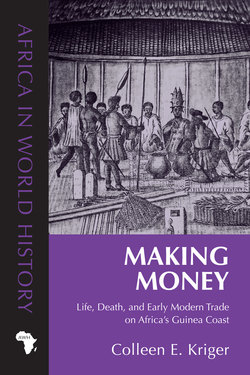Читать книгу Making Money - Colleen E. Kriger - Страница 9
ОглавлениеSERIES EDITORS’ PREFACE
The field of African history has developed considerably since it first emerged in the 1960s, coinciding with the independence that African nations were gaining from their European colonial overlords. An enormous literature has been generated over the ensuing decades, yet Africa’s past remains largely unknown to nonspecialists. Consequently, myths and stereotypes persist unchallenged, continuing to help produce profound misunderstandings of the continent. In order to engage these misperceptions and bring knowledge about Africa to a wider audience, students and instructors need accessible points of entry into the continent’s past.
To this end, Ohio University Press and the editors of this series seek to generate books for college and university instructors, and for undergraduate students, to bring the fruits of professional research on Africa to the attention of well-intentioned but often unaware readers in intriguing ways. The resulting books are intended to be both accessible and readily integrated into courses in world history, the history of the Americas, diasporic history, and the histories of other world regions.
In modern settings still rife with the residue of centuries of slaving and racial stereotyping, these books show Africans at work and at home, engaged in sport and a variety of other daily activities, and highlight the myriad ways that Africans have shaped the human experience throughout history. Although popular media focus on disease, political disorder, and destitution, the richness of the African experience, as showcased in the books in the series, suggests that the peoples of the continent, through their histories and cultures, bring great diversity to the human experience and enrich all of us. It is this enrichment that this series strives to offer.
The volumes in the series have displayed this diversity. Jim McCann’s Stirring the Pot, Peter Alegi’s Soccerscapes, and Todd Cleveland’s Stones of Contention have each featured insights into Africa’s past, plowing new ground on subjects seemingly familiar—cuisine, sport, and diamond mining—but largely misunderstood beyond the continent’s borders. More recently, John Mugane’s Story of Swahili traces the origins and myriad contributors to Africa’s best-known language, and Laura Lee Huttenbach’s The Boy Is Gone uses extensive interviews to paint a compelling picture of a Kenyan freedom fighter who became a tea farmer in the last decades of his life.
This volume, authored by Colleen Kriger, extends these efforts by working a cache of recondite archival materials from the Royal African Company in London, bringing to life the Europeans, Africans, and Euro-Africans who together traded slaves—and so much else—on the Upper Guinea Coast of West Africa at the end of the seventeenth century.
Books currently in preparation will continue to provide readers with intriguing, relevant, and accessible points of entry into Africa’s complex past and present. They will provide further opportunities for teachers and students to incorporate the continent into their courses and interests.
We invite readers of the series to call our attention to other topics they find promising for treatment along these lines, and we invite authors with themes that they are interested in developing to contact us about their projects.
